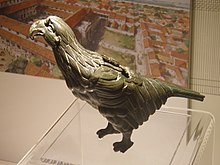Silchester eagle
| Silchester eagle | |
|---|---|
 The Silchester eagle | |
| Material | Bronze |
| Size | 6 inches (15 cm) high |
| Created | 1st or 2nd century CE |
| Period/culture | Roman |
| Discovered | 9 October 1866 Calleva Atrebatum |
| Discovered by | James Gerald Joyce |
| Present location | Reading Museum |
| Identification | REDMG : 1995.4.1 |
The Silchester eagle is a Roman bronze casting dating from the first or second century CE, uncovered in 1866 at Calleva Atrebatum in Silchester, Hampshire, England. It was purchased in 1980 by Reading Museum in Berkshire where it remains on display as of 2022[update].[1]
History
The Silchester eagle was discovered, wingless and damaged, on 9 October 1866 by the Reverend J. G. Joyce during the excavation of a Roman basilica where it was likely part of a larger statue.[1][2][3] It stands approximately 6 inches (15 cm) high and has a hollow space inside which was accessed through a (now missing) square lid located on the top of the back of the bird. It was found buried in a layer of charred wood, leading the discoverer to believe that it might have been the sacred eagle of a Roman legion and had been hidden for safekeeping in the rafters of the aerarium (treasury).[4]
However, more recent archaeologists have suggested that the piece may have been intended as nothing more than scrap metal by the Romans at the time that it was lost, and was awaiting being recycled when the aerarium burnt down.[5] The curve of the feet suggests that the eagle's talons had grasped a globe that was probably held in the hand of a statue, possibly of Jupiter.
See also
- The Eagle of the Ninth, the 1954 novel by Rosemary Sutcliff that was inspired by the Silchester eagle
- The Eagle, the 2011 film based on the novel
References
- ^ a b "Silchester Gallery". Reading Museum. 3 April 2017. Retrieved 11 September 2017.
- ^ Cornell, Tim; Matthews, John (1991). The Roman World. Stonehenge. p. 138. ISBN 978-0867065589.
- ^ "Unknown title". Minerva. 7: 28. 1996.
- ^ Gordon Hills (1873). "Proceedings of the Association: Notes on Roman Eagles". The Journal of the British Archaeological Association. Brit. Arch. Ass.: 183–5.
- ^ Fulford, Michael (1981). "Silchester". Current Archaeology (82): 328.
External links
![]() Media related to Silchester Eagle at Wikimedia Commons
Media related to Silchester Eagle at Wikimedia Commons
